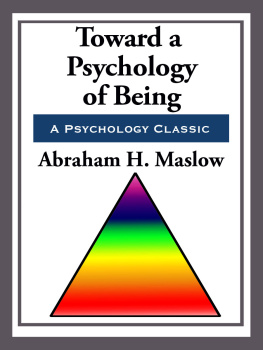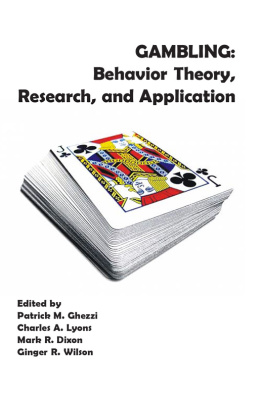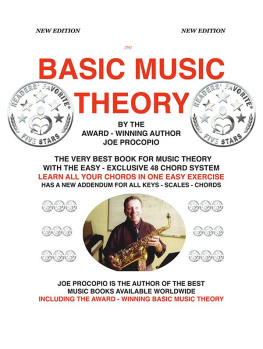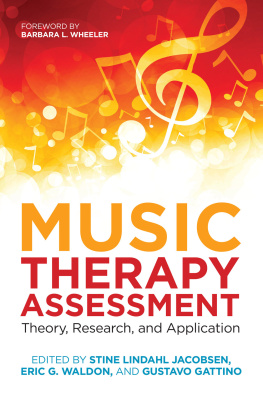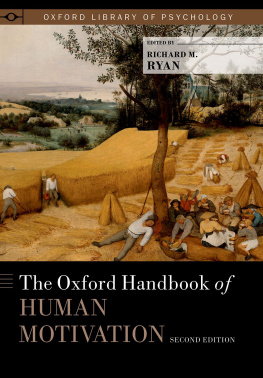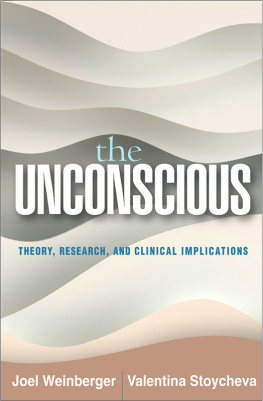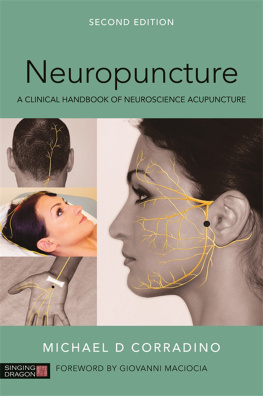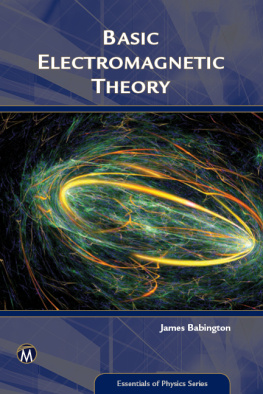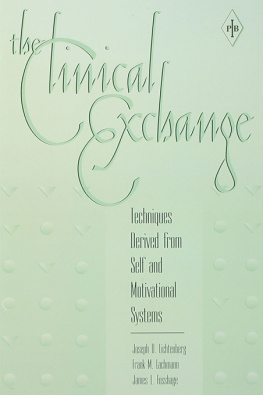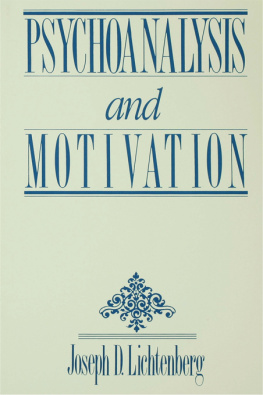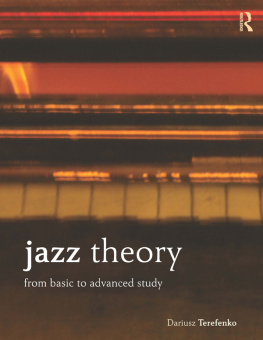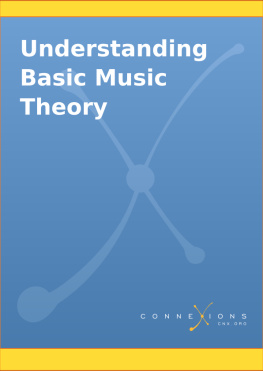Dancing Unicorn Books
Copyright 2017
All rights reserved, including the right to reproduce this book or portions thereof in any form whatsoever.
ISBN 13: 978-1-5154-1448-3
Manufactured in the United States of America
10 9 8 7 6 5 4 3 2 1
II. The Basic Needs
The physiological needs. The needs that are usually taken as the starting point for motivation theory are the so-called physiological drives. Two recent lines of research make it necessary to revise our customary notions about these needs, first, the development of the concept of homeostasis, and second, the finding that appetites (preferential choices among foods) are a fairly efficient indication of actual needs or lacks in the body.
Homeostasis refers to the bodys automatic efforts to maintain a constant, normal state of the blood stream. Cannon (2) has described this process for (1) the water content of the blood, (2) salt content, (3) sugar content, (4) protein content, (5) fat content, (6) calcium content, (7) oxygen content, (8) constant hydrogen-ion level (acid-base balance) and (9) constant temperature of the blood. Obviously this list can be extended to include other minerals, the hormones, vitamins, etc.
Young in a recent article () has summarized the work on appetite in its relation to body needs. If the body lacks some chemical, the individual will tend to develop a specific appetite or partial hunger for that food element.
Thus it seems impossible as well as useless to make any list of fundamental physiological needs for they can come to almost any number one might wish, depending on the degree of specificity of description. We can not identify all physiological needs as homeostatic. That sexual desire, sleepiness, sheer activity and maternal behavior in animals, are homeostatic, has not yet been demonstrated. Furthermore, this list would not include the various sensory pleasures (tastes, smells, tickling, stroking) which are probably physiological and which may become the goals of motivated behavior.
In a previous paper () it has been pointed out that these physiological drives or needs are to be considered unusual rather than typical because they are isolable, and because they are localizable somatically. That is to say, they are relatively independent of each other, of other motivations and of the organism as a whole, and secondly, in many cases, it is possible to demonstrate a localized, underlying somatic base for the drive. This is true less generally than has been thought (exceptions are fatigue, sleepiness, maternal responses) but it is still true in the classic instances of hunger, sex, and thirst.
It should be pointed out again that any of the physiological needs and the consummatory behavior involved with them serve as channels for all sorts of other needs as well. That is to say, the person who thinks he is hungry may actually be seeking more for comfort, or dependence, than for vitamins or proteins. Conversely, it is possible to satisfy the hunger need in part by other activities such as drinking water or smoking cigarettes. In other words, relatively isolable as these physiological needs are, they are not completely so.
Undoubtedly these physiological needs are the most pre-potent of all needs. What this means specifically is, that in the human being who is missing everything in life in an extreme fashion, it is most likely that the major motivation would be the physiological needs rather than any others. A person who is lacking food, safety, love, and esteem would most probably hunger for food more strongly than for anything else.
If all the needs are unsatisfied, and the organism is then dominated by the physiological needs, all other needs may become simply non-existent or be pushed into the background. It is then fair to characterize the whole organism by saying simply that it is hungry, for consciousness is almost completely preempted by hunger. All capacities are put into the service of hunger-satisfaction, and the organization of these capacities is almost entirely determined by the one purpose of satisfying hunger. The receptors and effectors, the intelligence, memory, habits, all may now be defined simply as hunger-gratifying tools. Capacities that are not useful for this purpose lie dormant, or are pushed into the background. The urge to write poetry, the desire to acquire an automobile, the interest in American history, the desire for a new pair of shoes are, in the extreme case, forgotten or become of secondary importance. For the man who is extremely and dangerously hungry, no other interests exist but food. He dreams food, he remembers food, he thinks about food, he emotes only about food, he perceives only food and he wants only food. The more subtle determinants that ordinarily fuse with the physiological drives in organizing even feeding, drinking or sexual behavior, may now be so completely overwhelmed as to allow us to speak at this time (but only at this time) of pure hunger drive and behavior, with the one unqualified aim of relief.
Another peculiar characteristic of the human organism when it is dominated by a certain need is that the whole philosophy of the future tends also to change. For our chronically and extremely hungry man, Utopia can be defined very simply as a place where there is plenty of food. He tends to think that, if only he is guaranteed food for the rest of his life, he will be perfectly happy and will never want anything more. Life itself tends to be defined in terms of eating. Anything else will be defined as unimportant. Freedom, love, community feeling, respect, philosophy, may all be waved aside as fripperies which are useless since they fail to fill the stomach. Such a man may fairly be said to live by bread alone.
It cannot possibly be denied that such things are true but their generality can be denied. Emergency conditions are, almost by definition, rare in the normally functioning peaceful society. That this truism can be forgotten is due mainly to two reasons. First, rats have few motivations other than physiological ones, and since so much of the research upon motivation has been made with these animals, it is easy to carry the rat-picture over to the human being. Secondly, it is too often not realized that culture itself is an adaptive tool, one of whose main functions is to make the physiological emergencies come less and less often. In most of the known societies, chronic extreme hunger of the emergency type is rare, rather than common. In any case, this is still true in the United States. The average American citizen is experiencing appetite rather than hunger when he says I am hungry. He is apt to experience sheer life-and-death hunger only by accident and then only a few times through his entire life.
Obviously a good way to obscure the higher motivations, and to get a lopsided view of human capacities and human nature, is to make the organism extremely and chronically hungry or thirsty. Anyone who attempts to make an emergency picture into a typical one, and who will measure all of mans goals and desires by his behavior during extreme physiological deprivation is certainly being blind to many things. It is quite true that man lives by bread alone when there is no bread. But what happens to mans desires when there is plenty of bread and when his belly is chronically filled?
At once other (and higher) needs emerge and these, rather than physiological hungers, dominate the organism. And when these in turn are satisfied, again new (and still higher) needs emerge and so on. This is what we mean by saying that the basic human needs are organized into a hierarchy of relative prepotency.
One main implication of this phrasing is that gratification becomes as important a concept as deprivation in motivation theory, for it releases the organism from the domination of a relatively more physiological need, permitting thereby the emergence of other more social goals. The physiological needs, along with their partial goals, when chronically gratified cease to exist as active determinants or organizers of behavior. They now exist only in a potential fashion in the sense that they may emerge again to dominate the organism if they are thwarted. But a want that is satisfied is no longer a want. The organism is dominated and its behavior organized only by unsatisfied needs. If hunger is satisfied, it becomes unimportant in the current dynamics of the individual.


